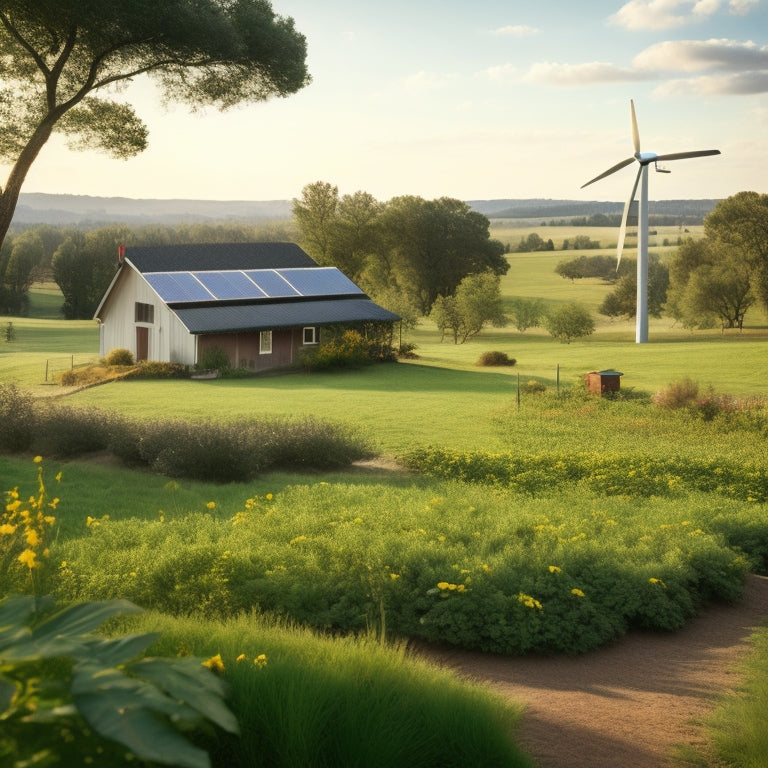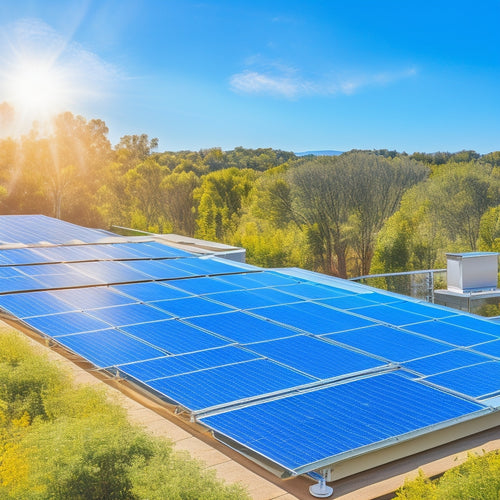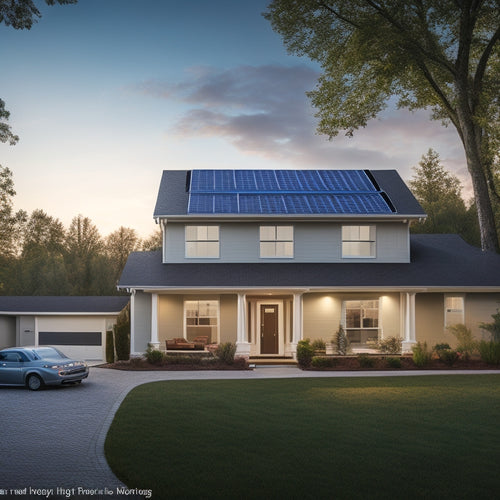
Break Free With Off-Grid Energy Systems
Share
You're already taking the first step towards breaking free from the grid by exploring off-grid energy systems, which can slash your monthly energy bills, reduce your carbon footprint, and bring you peace of mind during power outages. Off-grid energy systems provide independence from public utilities, allowing you to control your energy production and consumption. By adopting clean power alternatives like solar or wind energy, you'll not only reduce your reliance on fossil fuels but also contribute to a more sustainable future. As you move forward, you'll uncover the full range of benefits, from enhanced system reliability to increased property value, and open a path to true energy freedom.
Overview
- Break free from reliance on public utilities and gain control over energy production and consumption with off-grid energy systems.
- Enjoy financial freedom with significant cost savings from reduced energy bills and increased budget planning control.
- Contribute to a sustainable future by reducing your carbon footprint and adopting clean power alternatives like solar or wind energy.
- Ensure a steady power supply during outages and maintain an uninterrupted lifestyle with off-grid technology and energy resiliency.
- Increase your property value and appeal to eco-friendly homebuyers by installing off-grid energy systems and renewable energy sources.
Energy Independence Benefits
Achieving energy independence through off-grid energy systems brings numerous benefits, one of the most significant being the freedom from reliance on public utilities.
You'll no longer be tied to the grid, allowing you to enjoy energy sovereignty and self-sufficiency. This means you'll have control over your energy production and consumption, making you less vulnerable to power outages and rate hikes.
By reducing your reliance on fossil fuels, you'll also experience a significant reduced carbon footprint and contribute to a more sustainable future.
With off-grid energy systems, you'll be able to generate your own clean energy, reducing your carbon footprint and contributing to a sustainable future.
Reduced Monthly Expenses
Energy bills, a necessary evil for many, can be a significant drain on your wallet. By switching to an off-grid energy system, you can break free from the economic burden of monthly energy expenses.
With off-grid energy, you'll enjoy reduced monthly expenses, allowing you to allocate your budget more efficiently. This means you'll have more financial freedom to invest in other areas of your life.
Lowering your carbon footprint through renewable energy sources can also lead to a sustainable lifestyle, reducing your dependency on non-renewable energy.
By reducing your energy expenses, you'll experience cost savings that can add up to significant monthly savings over time. Effective budget planning and energy budgeting will become a breeze, as you'll have more control over your economic advantages.
The financial benefits of off-grid energy are undeniable, providing you with a sense of security and freedom.
Lower Carbon Footprint Now
You can markedly reduce your carbon footprint by minimizing energy consumption, which involves identifying areas of inefficiency in your daily habits and behaviors.
By adopting clean power alternatives, such as solar or wind energy, you can further decrease your reliance on fossil fuels. Embracing independence with solar power systems can also contribute to a lower carbon footprint, Energy Independence and Autonomy as it reduces greenhouse gas emissions and promotes clean energy.
Additionally, exploring eco-friendly energy sources, like geothermal or hydro power, can help you achieve a lower carbon footprint now.
Reduce Energy Consumption
By incorporating simple yet effective habits into daily routines, individuals can greatly reduce their energy consumption, thereby lowering their carbon footprint.
| Energy-Saving Strategies | Implementation Tips |
|---|---|
| Energy Efficient Appliances | Replace old appliances with Energy Star certified ones |
| Smart Home Technology | Install smart thermostats and lighting systems |
| Behavioral Changes | Turn off lights, electronics, and appliances when not in use |
| Energy Monitoring Systems | Install a system to track energy usage in real-time |
| Insulation Improvements | Add insulation to walls, floors, and ceilings to reduce heat loss |
Clean Power Alternatives
Frequently, homeowners rely on traditional power sources, unaware of the considerable impact they can have on the environment. You can break free from this cycle by exploring clean power alternatives.
Solar innovations, wind technology, and hydro solutions offer renewable energy sources with lower carbon emissions. Geothermal heating and biomass energy provide additional options for sustainable practices.
By incorporating energy efficiency measures, you can optimize your energy consumption. With the help of off-grid energy systems, you can generate clean energy independently, markedly reducing energy bills and increasing property value.
Microgrid systems and grid-tied options enable you to store excess energy for later use. Additionally, renewable incentives can help offset the initial investment costs.
Eco-Friendly Energy Sources
Utilizing eco-friendly energy sources is key to reducing your carbon footprint now. You can utilize solar innovations, wind technology, and biomass solutions to generate clean power.
Additionally, consider geothermal energy and hydroelectric systems as viable alternatives. To guarantee a steady supply, invest in energy storage solutions that align with your off-grid needs.
By adopting sustainable practices, you'll not only reduce your reliance on fossil fuels but also contribute to a cleaner environment. Tap into renewable resources and investigate community initiatives that promote eco-friendly living.
Moreover, take advantage of regulatory incentives that support your shift to off-grid energy. By doing so, you'll be well on your way to achieving energy independence and a lower carbon footprint.
Enhanced System Reliability
You'll want to guarantee your off-grid energy system is designed with reliability in mind.
This means incorporating system component redundancy to minimize single-point failures, power surge protection to shield against electrical spikes, and backup energy storage to provide a buffer during periods of low energy production.
System Component Redundancy
In an off-grid energy system, a single point of failure can have devastating consequences, leaving you without power when you need it most.
That's why it's essential to incorporate system component redundancy into your design. This involves selecting components with built-in redundancy, such as dual inverters or multiple charge controllers, to guarantee that if one fails, another can take over.
You should also develop maintenance strategies to identify and replace worn-out components before they fail. By doing so, you'll minimize downtime and guarantee a reliable supply of power.
With redundant components and a proactive maintenance approach, you'll be able to break free from the grid and enjoy the freedom and independence that comes with off-grid living.
Power Surge Protection
Protect your off-grid energy system from devastating power surges by installing reliable surge protection devices. You'll guarantee electrical safety and maintain equipment longevity by regulating voltage fluctuations.
Grid fluctuations can be unpredictable, so it's vital to reflect on installation factors, such as system compatibility and protection strategies. By doing so, you'll safeguard your energy management system from damage.
Regular maintenance practices, like inspecting and replacing surge protectors, will also help prevent system failures. A well-designed power surge protection plan will give you peace of mind, knowing your off-grid energy system can withstand unexpected spikes in energy.
Backup Energy Storage
With your off-grid energy system safeguarded against power surges, it's time to focus on securing a consistent flow of energy.
Backup energy storage is vital to maintaining system reliability. You'll need a dependable energy management system to efficiently store and distribute energy.
Battery technologies like deep-cycle batteries, lithium-ion batteries, and lead-acid batteries are popular options. These batteries work in tandem with your energy management system to store excess energy generated during the day for use during periods of low energy production or at night.
By incorporating backup energy storage into your off-grid system, you'll enjoy a consistent flow of energy, even when the sun isn't shining or the wind isn't blowing.
This guarantees you stay connected and powered, no matter what.
Increased Property Value
Sustainability becomes a coveted amenity as eco-friendly living gains mainstream appeal, and installing an off-grid energy system can greatly enhance your property's value.
In today's property market, homebuyers are willing to pay a premium for eco-friendly features, and off-grid energy systems are at the top of the list.
According to real estate experts, properties with off-grid energy systems can command higher prices and sell faster than those without.
By installing an off-grid energy system, you're not only reducing your reliance on the grid but also increasing your property's appeal to potential buyers.
This can lead to a significant return on investment, making your property a more attractive asset in the competitive real estate market.
Protection From Power Outages
As you enjoy the benefits of increased property value, you'll also appreciate the security that comes with off-grid energy systems.
With off-grid technologies, you're no longer reliant on the grid, which means you're protected from power outages. This energy resiliency is essential in today's unpredictable world, where natural disasters and infrastructure failures can leave you in the dark.
When the grid goes down, your off-grid system keeps running, providing you with a steady supply of power. This independence from the grid means you can continue to live your life uninterrupted, even when the rest of the world is struggling to cope.
You'll have peace of mind knowing you're prepared for any situation, and your freedom from the grid's limitations is truly liberating.
Frequently Asked Questions
Can I Install Off-Grid Systems in Urban Areas?
You can install off-grid systems in urban areas, but you'll need to maneuver city regulations, ensuring compliance with local building codes and ordinances that may restrict or complicate urban installation, so plan carefully.
How Do I Maintain My Off-Grid Energy System?
You're like a skilled conductor, ensuring harmony between your off-grid energy system's components; to do so, you'll need to regularly monitor your system's performance and follow maintenance tips like cleaning panels, inspecting wiring, and updating software to keep your energy flowing freely.
Are Off-Grid Systems Compatible With Existing Appliances?
You'll be relieved to know that most off-grid systems are compatible with your existing appliances, but you'll want to verify they're energy-efficient to maximize performance; check the appliance's power requirements and your system's capacity to guarantee seamless integration.
Can I Use Off-Grid Energy for My Entire Home?
You can power your entire home with off-grid energy by choosing suitable solar panel options and sizing your battery storage correctly, ensuring a reliable and efficient supply of electricity to meet your daily needs.
Do Off-Grid Systems Require Special Permits or Licenses?
You'll need to research permit requirements and licensing regulations in your area, as they vary, but typically, you'll require electrical and building permits, as well as compliance with local zoning laws and environmental regulations.
Ready to Buy
By breaking free with off-grid energy systems, you're not only reaping the benefits of energy independence, reduced monthly expenses, and a lower carbon footprint, but you're also enhancing system reliability, increasing property value, and protecting yourself from power outages. Did you know that off-grid homes use an average of 75% less energy than traditional grid-tied homes? This staggering statistic highlights the significant impact off-grid energy systems can have on our environment, making it an essential step towards a sustainable future.
Related Posts
-

What Types of Solar Energy Devices Are Available
You'll find several types of solar energy devices available today, each customized to different energy needs. Photovo...
-

Top Camping Water Bottles for Adventure
When you're out adventuring, picking the right camping water bottle is essential for staying hydrated. Look for durab...
-

Cost of Solar With Battery Backup
You're investing in a solar panel system with battery backup to guarantee reliable power during outages. The cost of ...


